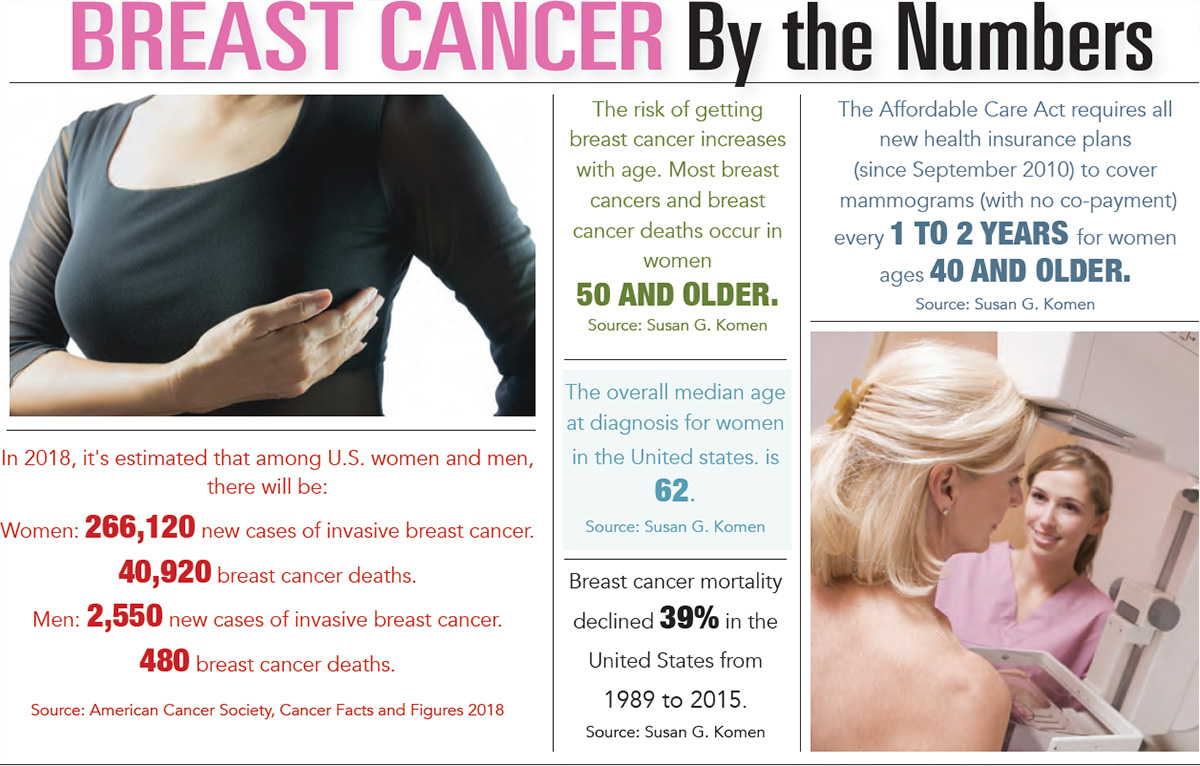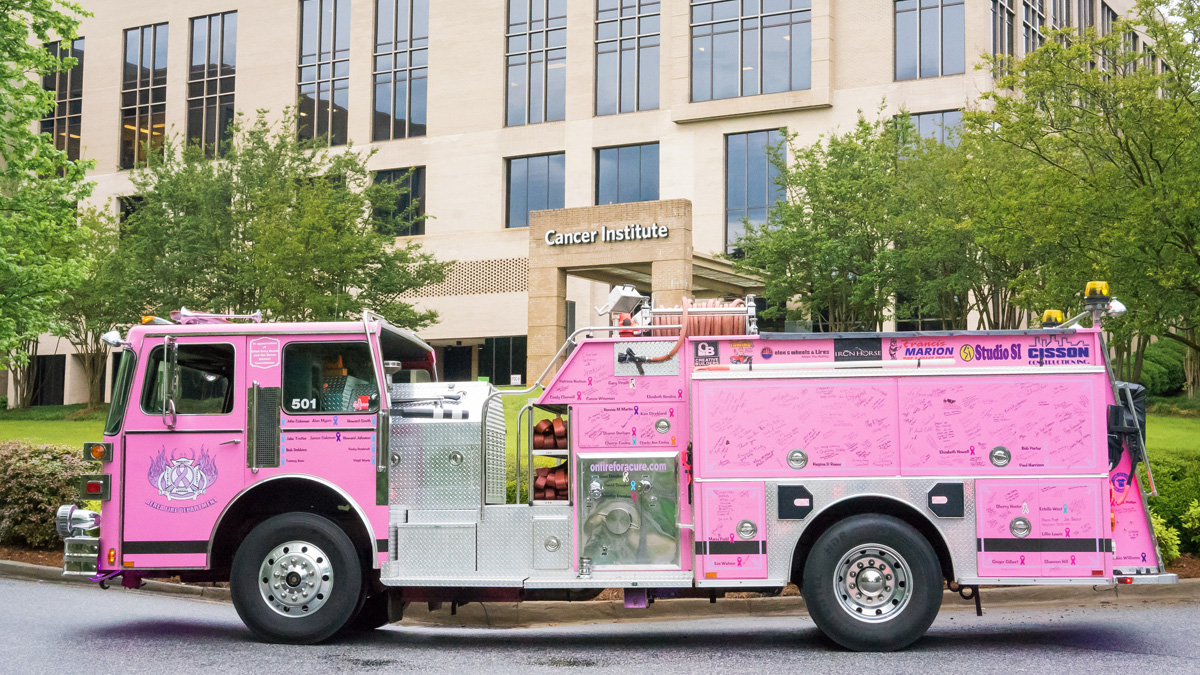It’s often difficult to find joy after a diagnosis of cancer. The diagnosis itself is enough to trigger anxiety in anyone, but that, along with chemotherapy and/or radiation treatments, planning for the future, financial burdens and just generally not feeling yourself, can produce stress that most healthy human beings could never comprehend or imagine. It’s hard. There is no doubt about that.
But finding joy in a cancer diagnosis? Is that even possible? The Berea Fire Department in Greenville has made it their mission to certainly try. And that is why they painted one of their fire trucks solid pink – to commemorate what these brave cancer-fighting souls have to face every day.
They wanted to show them that they aren’t alone, that they are looked up to as heroes and that to them, the firefighters of Berea, they should be reminded of their strength and personal will to not only survive but to thrive.
The pink fire truck was the least they could do. Lt. Bruce Blakely and Chris Vaughan, an engineer, of the Berea Fire Department in Greenville, actually came up with the idea. There was a 1987 fire truck that retired 10 years ago but is still used in reserve status – meaning that it is serviced, tested and kept up-to-date.
They thought, “why not color it pink and visit people as they finish chemotherapy and radiation procedures?” And, “why not” was exactly the reception they received when they presented the idea back in the fall of 2016.
They now have developed the pink fire truck as a 501(3)(c) nonprofit called On Fire for a Cure, as seen on their Facebook page, so that they can accept donations and use it as a fundraiser. To date, they have visited 60 cancer survivors and attended 43 different events, but hundreds of signatures fill the truck. Blakely said that anyone who is a cancer survivor can sign the truck, or people can sign it in memory of someone who lost their battle.
For Blakely, the pink fire truck hits home. His wife, Leslie, has been battling breast cancer since 2007.
“I saw how it helped her – seeing that truck as she left the hospital,” he said. “Cancer patients don’t have much to celebrate. It is our mission to make them happy.”
Blakely added that sometimes people will look for the signature of someone else they know and sign next to it.
“It makes people feel special to sign their name on the truck, but especially when they know someone else who has signed it,” he said.
When they bring the truck to the hospital to surprise a cancer patient, they always bring flowers as well, which are donated by Angel’s Flowers and Gifts in Greenville.
“It’s a community effort and everyone is so supportive,” Vaughan said.
Vaughan admitted that it was hard to explain the self satisfaction he feels when he sees the face of someone who has been battling cancer light up at the sight of the truck. He got involved with On Fire for a Cure in memory of his wife’s best friend, Jennifer Hardee, who passed away from breast cancer in 2016 after her original diagnosis in 2012.
“Jennifer thought she beat it, but it came back in 2015 and she passed a year later,” he said. “The truth is, I wish that no one ever had to sign that truck, but, until there is a cure, we will be there.”
The survivors Vaughan and Blakely have encountered since they began this journey range from people who were just diagnosed to those who have been fighting for many years or have completely recovered. We interviewed three of those brave souls – all at different stages of their diagnosis.
By Theresa Stratford
Here Are Their Stories
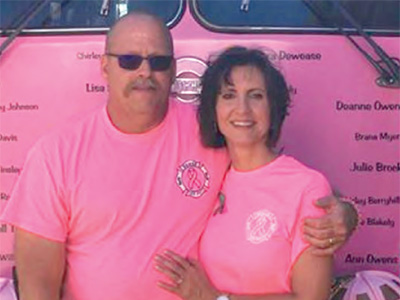 Leslie Blakely of Greenville, the wife of Bruce Blakely, has stage 4 breast cancer that has spread beyond her breasts to her bones. She will undergo treatments for the rest of her life.
Leslie Blakely of Greenville, the wife of Bruce Blakely, has stage 4 breast cancer that has spread beyond her breasts to her bones. She will undergo treatments for the rest of her life.
She was initially diagnosed as stage 1 in 2007 with invasive ductal carcinoma. Two small tumors were detected deep in the breast during a routine mammogram, and she had a bilateral mastectomy. It was not necessary for her to have chemotherapy or radiation, but, due to her cancer being estrogen receptor positive, for five years she took Tamoxifen, a drug prescribed to treat breast cancer or for people who may develop it.
About five months after going off Tamoxifen, she began having back pain.
“It was subtle at first but continued to get worse,” she said. “I eventually went to an orthopedic, but X-rays did not reveal anything at the time.”
Physical therapy was recommended, so she pursued that for several weeks with no relief.
Eventually, the pain became unbearable and she knew something wasn’t right. But, even so, the return of cancer was the furthest thing from her mind. She went to her primary care physician, who sent her for an MRI. Later that day, she received the call that she needed to be seen by her oncologist once again. Cancer had spread to her spine and pelvis, and she immediately began treatment.
“At the time, I thought this was a definite death sentence,” she said. “My cancer had been detected so early, but now I was being told it was stage 4. I was so naive and really had no idea this was a possibility. I was not very optimistic at the time. I tried to think positively but I will admit it was a struggle.”
Coincidentally, Blakely’s twin sister was initially diagnosed within a year before she was and also had a recurrence around the same time as Blakely was diagnosed as stage 4. Her sister has since finished treatment.
“One thing that many people don’t understand about stage 4, or metastatic cancer, is that there is no end to treatment. You are prescribed a medication until your disease becomes resistant to it, and then they try something else.”
Leslie and her twin have completed genetic testing, but the tests did not detect any mutation.
“Our aunt and her daughter both passed away from breast cancer, so there is an assumption that there is genetics involved in our case, but they have not been able to detect specifics yet,” she said.
She compares being diagnosed with breast cancer to a roller coaster ride.
“I was terrified and uneducated in the beginning,” she said. “But I have learned to trust my doctors.”
She said she went to Emory University for a second opinion at one point, and they confirmed her current treatment plan was on point and that there were additional drug options available for her when her current meds stopped working. She has total confidence in her oncologist, Dr. Kim Gococo with the Greenville Hospital System’s Cancer Institute.
“I couldn’t ask for better care from him or his team. I have been stage 4 for five years. I have bone cement in two vertebrae, a titanium rod in my left hip/femur and I fractured my pelvis, which required a plate and pins in order to be stabilized. While there have been many ups and downs, I have been blessed to have wonderful nurses and doctors who have become good friends. They mend what is ailing and keep me going both mentally and physically,” she said.
She described being surprised by the truck when she finished one of her many rounds of radiation as emotionally overwhelming: “When I saw my husband and partners in the parking lot with the pink truck – I simply had no words and the tears started flowing.”
She concluded, “When you are diagnosed with cancer, you often feel very alone and people have different ways of dealing with it. Some are more open to talk about their situation and others wish to be more private. Either way, the truck and the men of the Berea Fire Department are there to encourage you at whatever stage of treatment you may be in. And whether you are the patient or a caregiver, you can’t help but feel the support and the unity that this truck provides to all who are involved.”
She also said, “I couldn’t be prouder of my husband and the men at the Berea Fire Department for coming together and making this a reality. My husband lost all four grandparents to cancer, and the whole fire department family has suffered many losses due to cancer. This truck provides these men the ability to show support and to memorialize and celebrate the lives of those who have already passed and to let those know who are currently fighting that they are not alone.”
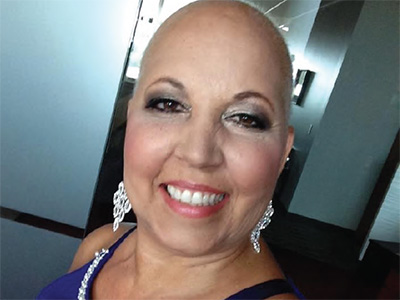 Kelly Richardson of Greenville, was diagnosed with stage 2 breast cancer in January of 2016.
Kelly Richardson of Greenville, was diagnosed with stage 2 breast cancer in January of 2016.
“For me it was through a routine mammogram as well,” she said. “I was over 50 and had good health insurance, so I said, ‘why not?’ My husband told me I should get that done along with a colonoscopy just for preventive reasons. I really thought nothing of it.”
She was in good health and in shape, so she was shocked when the test came back saying that there was something there.
“They told me we could just watch it or get more tests done,” she said. “I decided to get more tests done.”
The tests came back positive for breast cancer. Richardson started chemotherapy in February 2016. She said she had treatment every three weeks up until June. Later that summer, she also underwent a lumpectomy. After that, she went through five days a week of radiation, 30 rounds to be exact, until October 2016.
“But it wasn’t over,” she said. “I then underwent infusions of medication up until January 2017.”
She said that the entire year of 2017 was recovery – both physically and mentally.
“All my hair was gone, even in my nostrils,” she said. “You don’t know how much you need those little nose hairs until they are gone.”
She also gained 43 pounds.
“With that type of breast cancer, you actually gain weight. Plus I didn’t feel well for so long, so I wasn’t moving much,” she said.
The good news is that to date, Richardson has lost all the weight and is actually on her way to losing 10 more pounds.
“I felt I really had something to live for, and I wanted to make the best of my life,” she said. “I had my first grandchild born in November of 2016, and I want to be there for her.”
Richardson had heard many cancer patients ring a bell, and she wanted to do the same when she finished her radiation. However, the facility where she was receiving treatment didn’t have a bell for her to ring because the sound made people who weren’t going to survive feel bad.
“I was a bit disappointed, but my husband did some research and found out about the pink fire truck,” she said.
Richardson said that when she saw the truck, she couldn’t stop crying.
“It signified the end of my treatment,” she said. “They let me wear the hat and took me for a ride. And, of course, I got to sign it.”
Her advice to others is to make an appointment to get a mammogram.
“I had no idea,” she said. “I never felt a lump. If it wasn’t for that routine mammogram, I may not be here talking to you today.”
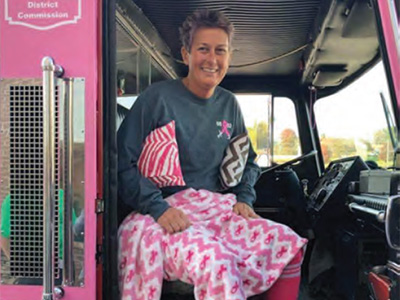 Kim Strickland of Anderson actually felt a small marble in her right breast. She said it was hard and that she could actually see it sticking out a bit. That was in April 2017. She had a primary care appointment two weeks after she noticed the lump, so she decided to wait to get it checked out. A mammogram and an ultrasound later, at AnMed Women’s and Children’s Hospital, a doctor told her it was just a 4 centimeter cyst.
Kim Strickland of Anderson actually felt a small marble in her right breast. She said it was hard and that she could actually see it sticking out a bit. That was in April 2017. She had a primary care appointment two weeks after she noticed the lump, so she decided to wait to get it checked out. A mammogram and an ultrasound later, at AnMed Women’s and Children’s Hospital, a doctor told her it was just a 4 centimeter cyst.
“It was black,” she said. “And they said I had several other tiny ones. But they said I should only do something about it if it was bothering me. So I didn’t do anything, and it remained the same for about six months.”
In October 2017, she noticed the same lump on her left breast. She happened to have another primary care appointment for her regular six-month checkup scheduled for three weeks later. An ultrasound revealed that the small lump on the right side was no longer black and actually appeared to have some white in it. It seemed as though the cyst had burst and a tumor was now showing through. The left lump was cloudy.
A week after that appointment, she had a biopsy and got the results another week later – all at AnMed Women’s and Children’s Hospital. Sure enough, Strickland was diagnosed with bilateral breast cancer.
“Everything happened very quickly after that,” she said. “I went for an MRI later that week and had a double mastectomy on Nov. 14, 2017.”
The surgery lasted seven hours, and, when she left the hospital the next day, the pink truck was outside.
“I didn’t even know about it. I was so surprised,” she said.
One of Strickland’s best friends, Dean Douglas, a paramedic for Pickens EMS and an EMS educator with the Greenville Health System’s Division of Prehospital Medicine, had reached out to Bruce Blakely about bringing the truck to see Strickland as she left the hospital.
Strickland also happens to be a firefighter – for the past 20 years.
“It was such a wonderful experience for me. I couldn’t have been happier,” she said. “I had four drain tubes, and I was sitting in a wheelchair. Bruce just came up to me and said he wouldn’t hurt me and that he wanted to help me sign the truck.”
The pink fire truck took Strickland to her house, but not before they made a stop at her other job so that she could say “hi” to her friends.
“Two trucks followed. One was from my fire department, Broadway, and the other from Anderson City, where I used to work,” she said. “I really got the royal treatment.”
Strickland was able to go back to work after Christmas in 2017 for a short period of time before she had to endure more reconstructive surgery.
“That was the most painful part,” she said.
She took off work again at the end of January and returned a little after Valentine’s Day this year.
Since then, she has undergone physical therapy, because she had trouble raising her arms, lymph nodes were removed, four on her left side and three on the right, she started radiation in March and has undergone 30 treatments.
“I went every day for six weeks for radiation,” she said. “And the pink fire truck came to see me again after I finished those treatments. It was so exciting.”
Strickland can no longer fight fires, but she is happy to be slowly feeling back to normal.
“I don’t know if I have fully processed it yet,” she said. “It all happened so very fast.”
She said she feels extremely lucky to have had overwhelming support from her community in Anderson.
“That pink truck is so special,” she said. “It means so much. It is something to look forward to for so many people fighting this disease.”
Unfortunately, her paramedic friend, Dean Douglas, passed away from throat cancer in March.
“He was diagnosed around when I was going through my reconstructive surgery,” she said. “He was an uplifter and a go-getter.”
Bruce Blakely and Strickland have become great friends since she met him on the pink fire truck.
“Bruce has become my Dean. That truck is the best thing ever,” she said. “They do it out of the goodness of their heart, and it has helped so many people.”
It may be just a truck, but to the people who have signed it, the truck represents a second chance at life and a reason to celebrate.
For more information on the pink fire truck and On Fire for a Cure, visit their Facebook page at www.facebook.com/onfire4acure.
